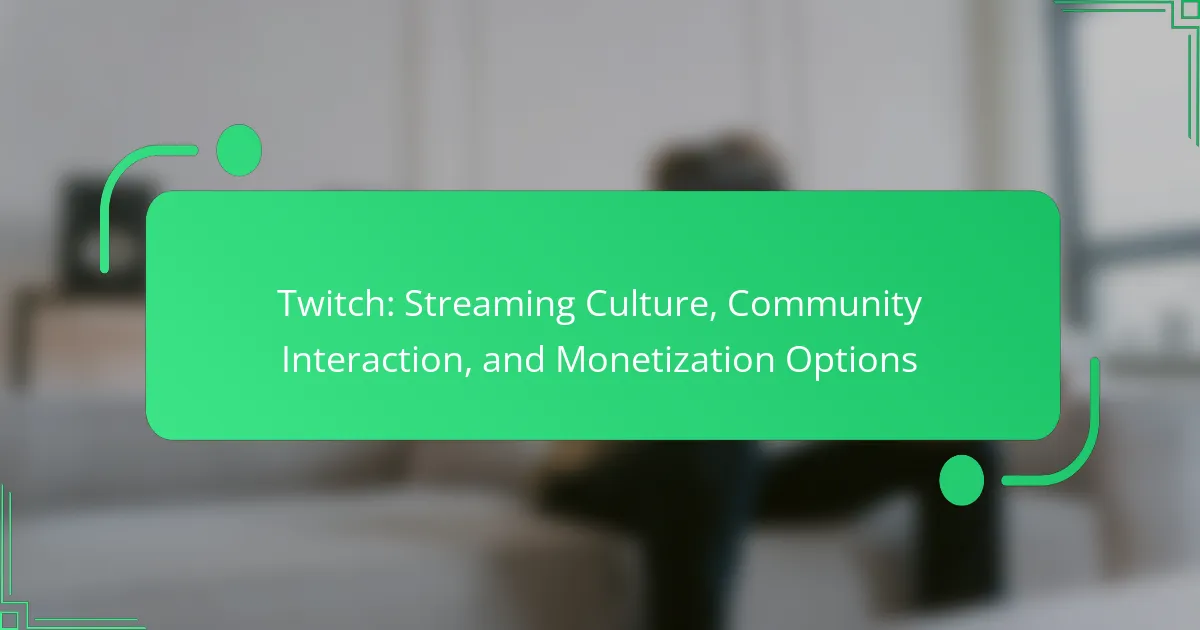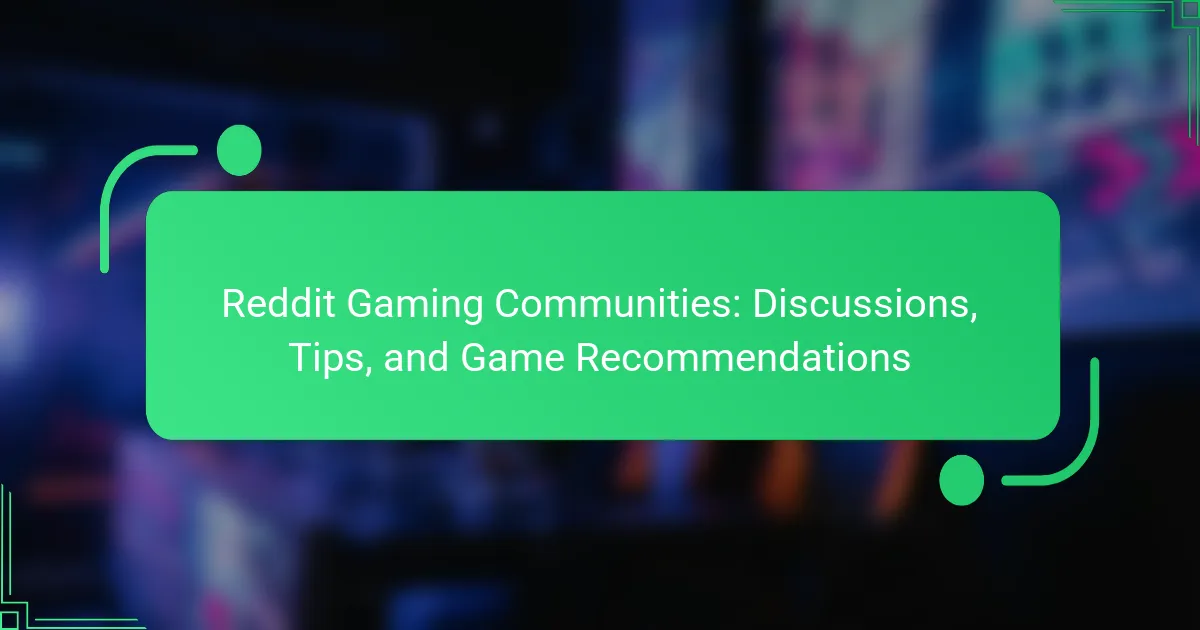The Epic Games Store offers a unique gaming experience with free games, exclusive titles, and a focus on community feedback. Users can enjoy weekly free game promotions while accessing popular exclusive titles like “Fortnite” and “Gears 5.” Community input shapes game development and platform features, enhancing user satisfaction. However, challenges such as limited payment options and interface complexity can impact the overall experience.
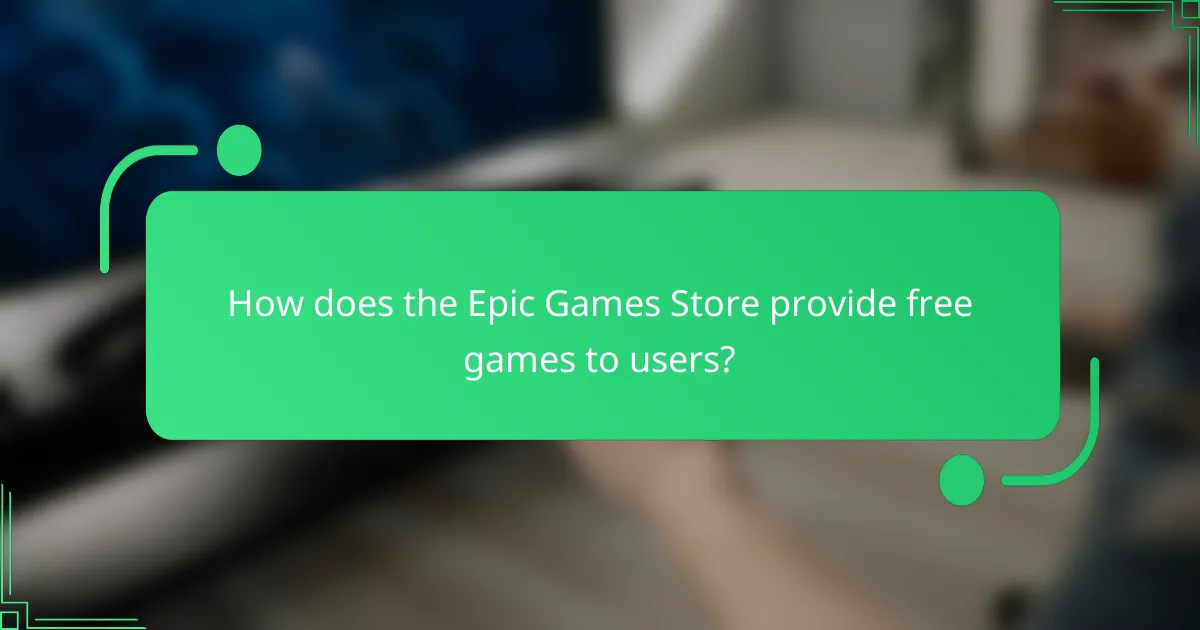
How does the Epic Games Store provide free games to users?
The Epic Games Store provides free games to users through promotional strategies and partnerships. Each week, the platform offers a selection of free titles, encouraging user engagement and expanding its community. This approach boosts visibility for both the store and game developers, enhancing the overall gaming ecosystem. Exclusive titles and community feedback further strengthen user loyalty and attract new players.
What are the criteria for selecting free games?
Selecting free games on the Epic Games Store involves evaluating several criteria. Key factors include game quality, user reviews, and exclusivity. Popular titles often receive higher ratings, reflecting community feedback. Exclusive games can enhance the library’s appeal, attracting more players. Availability of in-game content or updates also influences selection.
How often are free games updated?
Free games on the Epic Games Store are typically updated every two weeks. This regular schedule allows users to access new titles and explore exclusive offerings. Community feedback plays a vital role in shaping the selection of free games, ensuring a diverse range of genres and experiences. The store often promotes popular titles and emerging indie games, enhancing user engagement and satisfaction.
What are the benefits of claiming free games?
Claiming free games offers significant benefits, including cost savings and access to exclusive titles. Gamers can explore diverse genres without financial commitment, enhancing their gaming library. Additionally, community feedback on these games fosters a collaborative environment, improving future releases. Engaging with free games also allows players to discover hidden gems they might not have purchased otherwise.
How do regional differences affect the availability of free games?
Regional differences significantly impact the availability of free games on the Epic Games Store. Factors such as local laws, market demand, and partnerships shape game offerings. For example, certain titles may be exclusive to specific regions due to licensing agreements. Additionally, community feedback influences which games are prioritized for free distribution, reflecting regional player preferences. This dynamic ensures that the Epic Games Store adapts to diverse gaming cultures and interests worldwide.
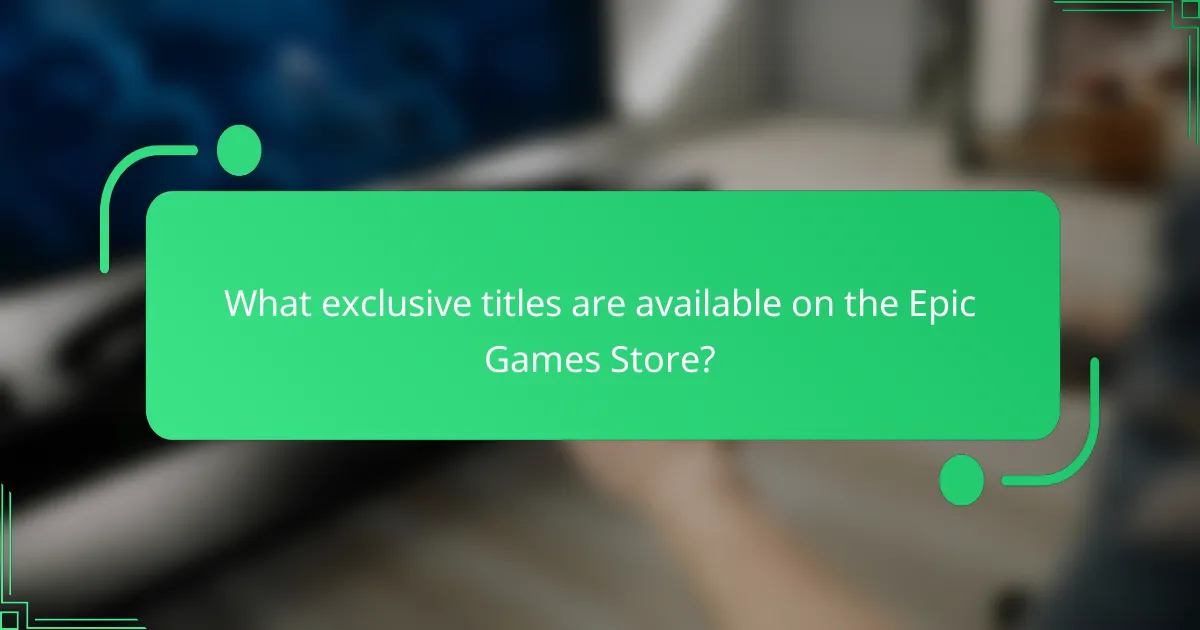
What exclusive titles are available on the Epic Games Store?
The Epic Games Store features exclusive titles such as “Fortnite,” “Gears 5,” and “The Outer Worlds.” These games are not available on other platforms, enhancing the store’s appeal. Exclusive content often includes unique in-game items and experiences, attracting a dedicated player base. Regular updates and community feedback shape the development of these titles, ensuring they meet player expectations.
How do exclusive titles influence user engagement?
Exclusive titles significantly enhance user engagement by creating a sense of uniqueness and loyalty among players. These games often attract new users, as they are only available on the Epic Games Store, increasing the platform’s appeal. Additionally, exclusive titles frequently receive community feedback, which can lead to improved game features and updates. This interaction fosters a stronger connection between developers and players, further boosting engagement levels.
Which genres are most represented in exclusive titles?
The most represented genres in exclusive titles on the Epic Games Store are action, adventure, and role-playing games. These genres dominate due to their popularity and the immersive experiences they offer. Notably, the action genre often features fast-paced gameplay, while adventure titles emphasize storytelling. Role-playing games provide deep character development and expansive worlds.
What are the benefits of exclusive titles for developers?
Exclusive titles for developers enhance visibility and revenue. They create unique gaming experiences, fostering brand loyalty. Exclusive games often generate community engagement, leading to valuable feedback for future projects. Additionally, they can attract new users to platforms like the Epic Games Store, increasing overall user base and market share.
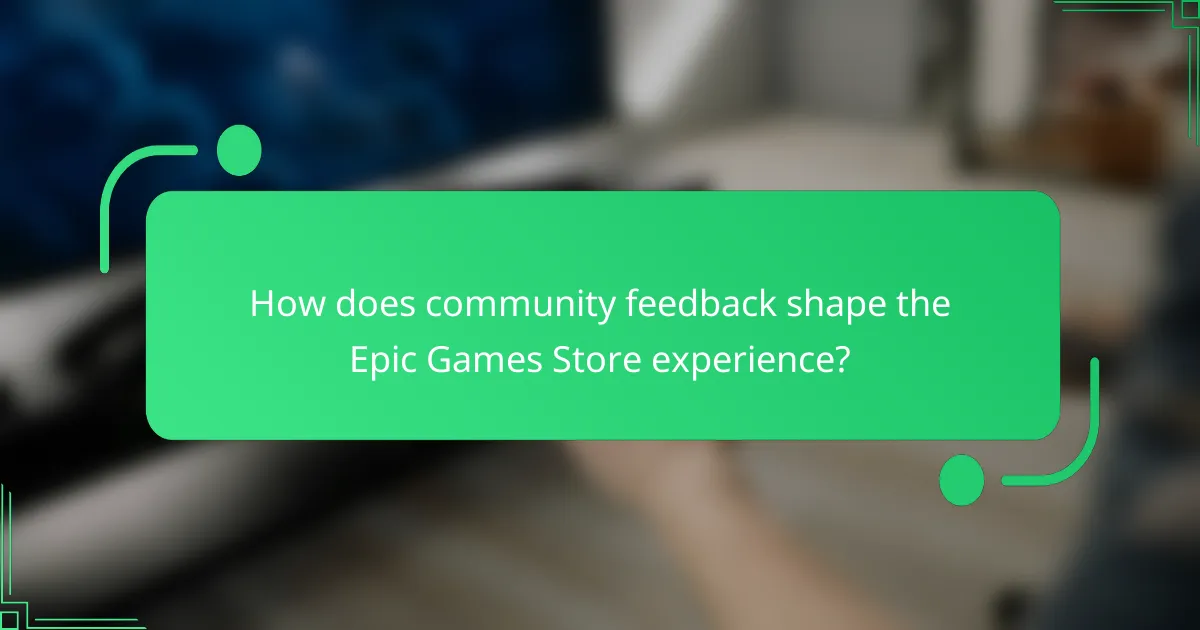
How does community feedback shape the Epic Games Store experience?
Community feedback significantly enhances the Epic Games Store experience by guiding game selection and platform improvements. User reviews and ratings inform developers about player preferences, leading to better game offerings. Exclusive titles often receive adjustments based on community input, ensuring they align with player expectations. Moreover, feedback mechanisms foster a sense of community, encouraging players to engage and share their experiences. This iterative process ultimately shapes a more user-centered platform, driving both player satisfaction and loyalty.
What channels are available for users to provide feedback?
Users can provide feedback on the Epic Games Store through several channels. These include the official forums, social media platforms, and direct support tickets. The forums allow users to discuss issues and suggestions openly. Social media channels, such as Twitter and Facebook, enable users to engage with the brand and share their thoughts. Direct support tickets offer a more personal avenue for addressing specific concerns or feedback.
How is community feedback implemented in game updates?
Community feedback directly influences game updates by guiding developers on player preferences and issues. Epic Games Store actively collects player input through surveys, forums, and in-game feedback systems. This data shapes future content, bug fixes, and gameplay adjustments. Regular updates reflect community desires, enhancing user satisfaction and engagement. For instance, players may request specific features, leading to their implementation in subsequent patches.
What role does community feedback play in game development partnerships?
Community feedback is crucial in game development partnerships as it shapes game design and enhances player satisfaction. Epic Games Store leverages community insights to refine exclusive titles and free offerings. This feedback loop fosters a collaborative environment, allowing developers to align their games with player expectations. As a result, games often see higher engagement and retention rates, demonstrating the value of community input in the development process.
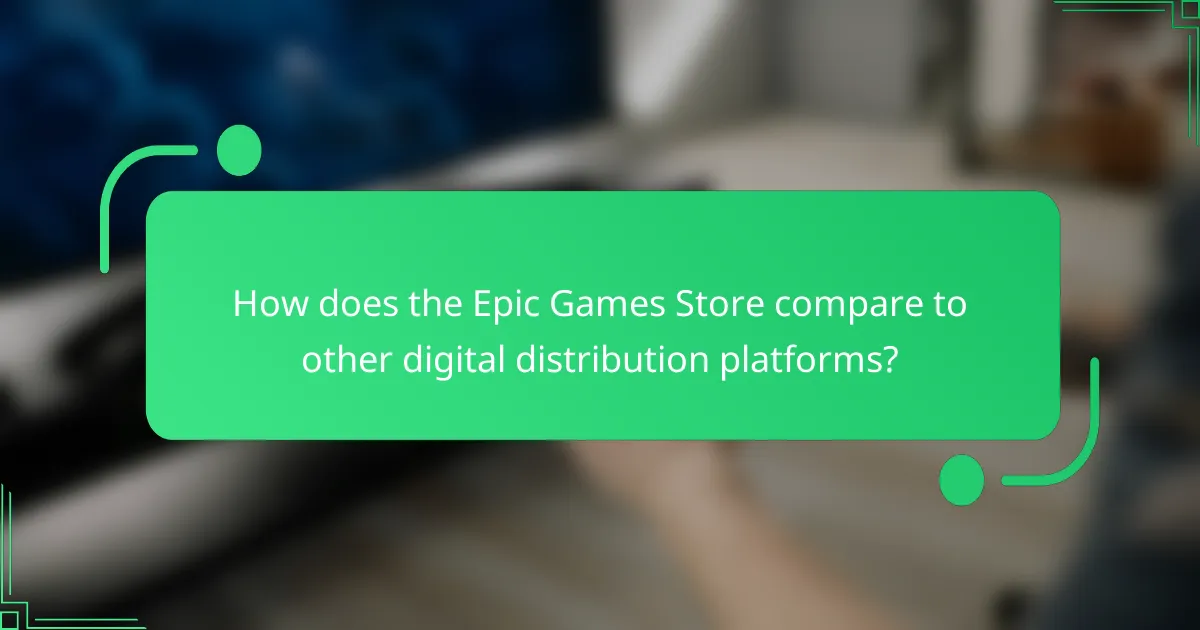
How does the Epic Games Store compare to other digital distribution platforms?
The Epic Games Store offers free games and exclusive titles, making it competitive with other platforms. Its unique approach includes regular giveaways and a focus on community feedback, which enhances user engagement. For instance, the store frequently provides high-profile games at no cost, differing from competitors like Steam and Origin. This strategy attracts a diverse player base while fostering loyalty through exclusive content. Additionally, the Epic Games Store has a more developer-friendly revenue split, incentivizing game creators to publish on its platform.
Which features set the Epic Games Store apart from competitors?
The Epic Games Store stands out due to its free games, exclusive titles, and strong community feedback. The platform frequently offers free titles, enhancing user engagement and attracting new players. Exclusive games, such as “Fortnite” and “Epic’s own titles,” provide unique content not available on other platforms. Additionally, community feedback shapes development, allowing players to influence future updates and features, fostering a more interactive gaming environment.
How do user experiences differ across platforms?
User experiences on the Epic Games Store vary significantly from other platforms due to its unique offerings. The store provides free games regularly, exclusive titles unavailable elsewhere, and encourages community feedback through reviews and forums. These elements create a distinct engagement compared to platforms like Steam or Origin, which may prioritize user-generated content or subscription services. Additionally, the Epic Games Store’s focus on exclusive releases enhances its appeal, attracting users seeking unique gaming experiences.
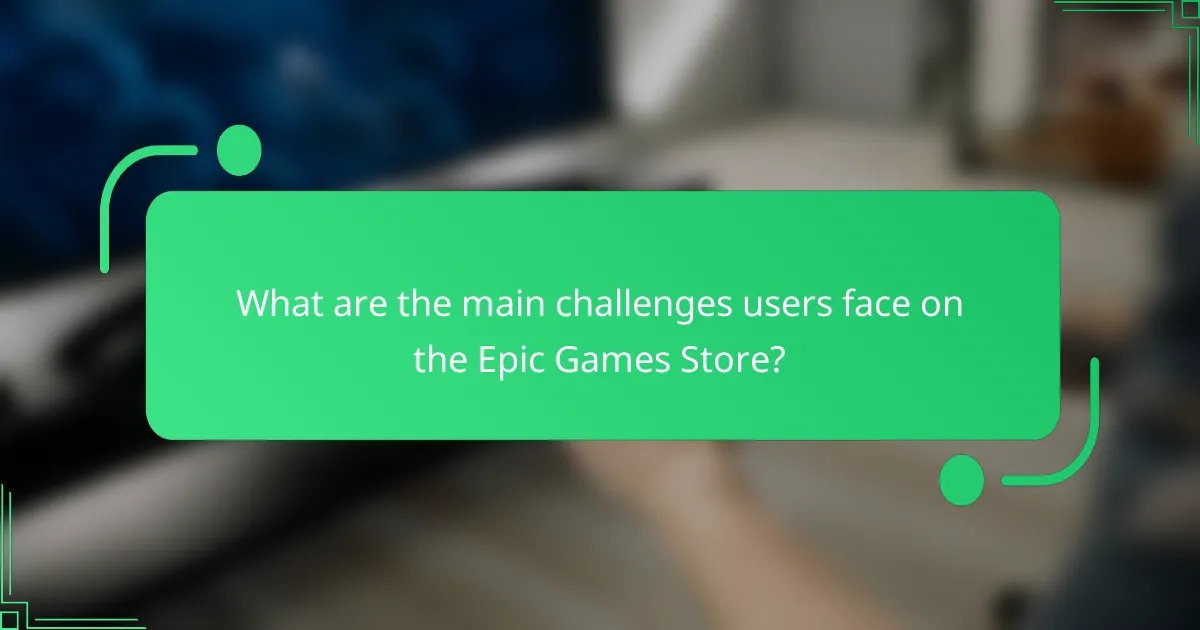
What are the main challenges users face on the Epic Games Store?
Users face several challenges on the Epic Games Store, including limited payment options, regional restrictions, and performance issues. The store’s exclusive titles can create a dependency on its platform, leading to frustration for users who prefer other services. Additionally, community feedback often highlights concerns about customer support responsiveness and the user interface’s complexity. These factors can impact overall user satisfaction and engagement with the platform.
How does the store address user complaints?
The Epic Games Store addresses user complaints through a dedicated support system and community engagement. Users can submit feedback directly via the store interface, and the support team actively monitors forums and social media for concerns. Regular updates are issued based on user feedback, enhancing game performance and user experience. The store also hosts community events, fostering a dialogue that helps identify and resolve issues efficiently.
What common technical issues do users encounter?
Users frequently encounter issues with game downloads, account access, and performance on the Epic Games Store. Common problems include slow download speeds, failed installations, and difficulty logging into accounts. Additionally, users may experience crashes or freezes during gameplay. These issues can stem from server overloads, network connectivity problems, or software conflicts. Regular updates and community feedback often help address these technical challenges.
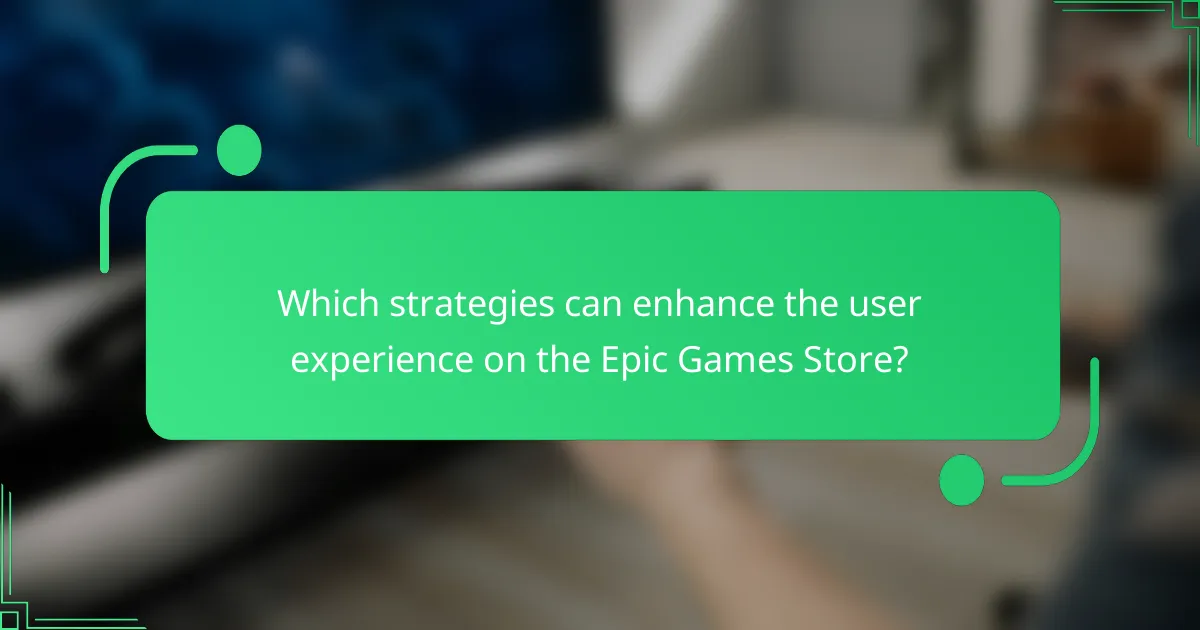
Which strategies can enhance the user experience on the Epic Games Store?
To enhance the user experience on the Epic Games Store, focus on personalized recommendations, streamlined navigation, and community engagement. Personalized recommendations increase user satisfaction by tailoring content to individual preferences. Streamlined navigation simplifies the discovery of games, making it easier for users to find titles they enjoy. Community engagement fosters a sense of belonging, allowing users to share feedback and connect with other gamers, enhancing overall satisfaction.
What best practices should users follow when claiming free games?
To claim free games on the Epic Games Store effectively, users should follow these best practices. First, create an Epic Games account to access the store. Next, regularly check the store for new free titles, as they change weekly. Additionally, enable notifications for updates and promotions. Finally, redeem games promptly within the specified timeframe to ensure access. These practices enhance the gaming experience and maximize the benefits of exclusive titles.
How can users maximize their enjoyment of exclusive titles?
To maximize enjoyment of exclusive titles on the Epic Games Store, users should actively engage with the community and explore available features. Participate in forums to share experiences and tips. Utilize the store’s user reviews to inform purchase decisions. Take advantage of seasonal events and promotions to access exclusive content at lower prices. Regularly check for free game offerings to expand your library without cost.
What common mistakes should users avoid when providing feedback?
Users should avoid vague feedback and focus on specific issues. Providing clear and detailed comments helps developers understand user concerns. Common mistakes include failing to mention platform issues, not suggesting improvements, and overlooking the importance of constructive criticism. Engaging with the community and sharing personal experiences can enhance feedback quality.


